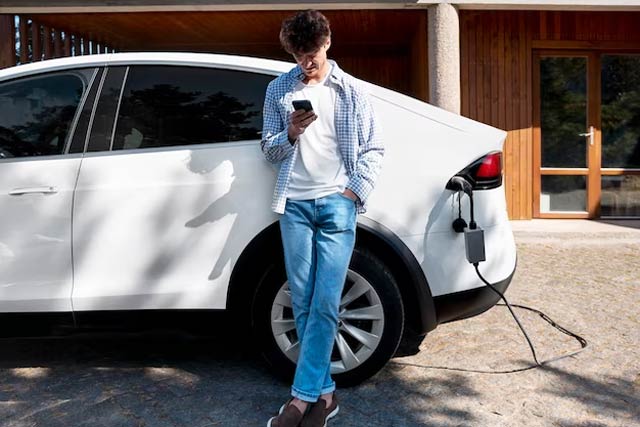Home EV charging stations provide a number of benefits that help make the transition to an EV easier. From cost savings to increased property value, there are many reasons why EV owners should consider having an EV charger installed at their house or business.
EV charging equipment can plug into your garage outlet and charge the vehicle, or it can be hardwired into a dedicated 240-volt circuit. A hardwired charger lets you use the outlet for other purposes when you’re not charging.
1. Convenience

Electric vehicles are a great way to reduce fuel costs and reduce your carbon footprint. But for EV owners, it’s essential to have a reliable home charging station in place. It’s not only convenient, but it can also save you a lot of money over time.
With the benefits of home EV charging stations, you can skip the trips to the gas station and avoid the high electricity rates charged at public stations. In addition, you can take advantage of off-peak energy rates to charge your EV more efficiently. And since your battery will be charged slower, it can extend its life by up to 20%.
You can hardwire a home EV charger or use a 240-volt outlet. Some models include features like surge protection, automatic shutoff, and Wi-Fi for monitoring. Residential charger prices vary, but smart models can integrate with solar, offering long-term benefits.
Due to rising EV demand, utilities offer incentives for home charging. These can cover installation costs or offset expenses.
In addition to these utility rebates, there are also a number of federal tax credits available for EV owners who want to install a home charging station. These can help you reduce the overall cost of your EV purchase and installation, saving you thousands of dollars.
Read More: HOW CAR KEY FOBS WORK AND WHEN TO GET A REPLACEMENT
2. Energy Efficiency

A home EV charger gives you control over how long and at what speed your car charges. This makes it easy to avoid the stress of range anxiety and gives you peace of mind knowing you can always leave your home with a full charge. Gone are the days of worrying about running out of gas in an unfamiliar town.
Home charging stations are also usually much cheaper than using public ones. Depending on your location and energy provider, you might be able to take advantage of off-peak rates during the night or weekend. This can save you a lot of money in the long run.
Adding an EV charger at home might increase your electricity bill, but it needn’t be costly. You can cut energy usage with LED lighting and smart thermostats, which are more efficient than traditional options. Further, you can lower bills by using solar and other renewable energy sources.
To estimate the cost of an EV charger, visit Qmerit, a network of specialized electrical contractors nationwide. While prices vary by location, expect to invest a few hundred dollars for equipment and installation.
The best EV charging station are sized to match the maximum charging rate of your vehicle. This means you’ll need a 240-volt outlet installed to accommodate your vehicle. You can determine the maximum charging rate by multiplying your vehicle’s onboard charger value in watts by 1,000 and dividing it by 240 volts. For example, a Volkswagen ID.4 has an 11-kilowatt charger, so you would need a 48-amp circuit to charge fully.
You can also use a smart EV charger with dynamic load balancing to minimize energy costs. This technology will lower the charging power of your EV during peak times, freeing up capacity for other appliances that are running in the house. You can even feed electricity back into the grid with vehicle-to-grid technology to reduce your reliance on the power company.
3. Increased Property Value

As the world moves towards more sustainable practices and solutions, home buyers are looking for properties that offer eco-friendly features. One way to do this is by installing a residential EV charging station at the property. This allows buyers to recharge their EVs without searching for or waiting in long public charging station queues. It also helps save them money, as charging at home is typically cheaper than relying on public stations due to off-peak electricity rates.
In fact, studies have shown that homes with charging stations have higher resale value than those without. This is because prospective homebuyers are more likely to pay a premium for a property that allows charging their electric vehicle at home. This is especially true in urban areas, where access to public charging stations may be limited and time-consuming.
A residential EV charging station isn’t as expensive as other upgrades, such as a new kitchen or bathroom, which can increase the home’s value. In fact, adding a Level 2 charger to your home is often less than $1,000, including installation. And, if your home’s existing electrical service can handle it, you can install a more advanced DC fast charger for under $2,000.
For businesses and multifamily buildings, adding an EV charging station is an excellent investment. These can help attract employees and customers who are looking for places to charge their vehicles, and they can also increase the likelihood of tenants renewing their leases. Plus, it’s a great way to show that the property is forward-thinking and committed to sustainability.
When considering an EV charging station for your business or building, select the right model. Seek a brand with diverse options, from home chargers to high-speed commercial stations. Prioritize a company with an extended warranty and dependable customer support for long-lasting, trouble-free operation.
4. Reduced Carbon Footprint

EV chargers cut your carbon footprint by using clean, renewable electricity instead of polluting fuels. For instance, myenergi Zappi EV chargers work with solar and wind power, enabling eco-friendly self-generated energy for your electric vehicle.
Additionally, programming your home charger to operate during low-cost nighttime hours can boost your savings. Many EV owners plug in their vehicles overnight, ensuring a fully charged car by morning while still going about daily routines.
EVs are more cost-effective per mile compared to gas-powered cars, sparing you the expense of gasoline. While initial EV charging station costs can be a deterrent, when you factor in long-term savings from lower energy bills and reduced maintenance, owning one can be surprisingly affordable.
Moreover, home EV charging stations offer slower charging, which enhances battery life and increases the range between charges. In contrast, public charging stations charge high rates during peak demand, which can noticeably decrease battery longevity.
As a result, the upfront investment of an EV charging station will soon pay for itself. Many homeowners also report that an EV charger is desirable for potential buyers and can increase property value. EV chargers are often listed as one of the “must-have” amenities for new homebuyers.
In a similar vein, adding EV charging stations to rental properties can help future-proof the building and keep it competitive in the real estate market. In addition, it can encourage residents to adopt green habits and contribute to a healthier environment.
Read More: HOW TO FIX CRANKSHAFT POSITION SENSOR WIRING HARNESS
Summary
The benefits of EV charging stations at home are clear. They offer convenience, energy efficiency, increased property value, and a reduced carbon footprint, making them a smart choice for electric vehicle owners. These stations not only streamline the charging process but also contribute to a more sustainable and cost-effective way of owning and operating electric vehicles.